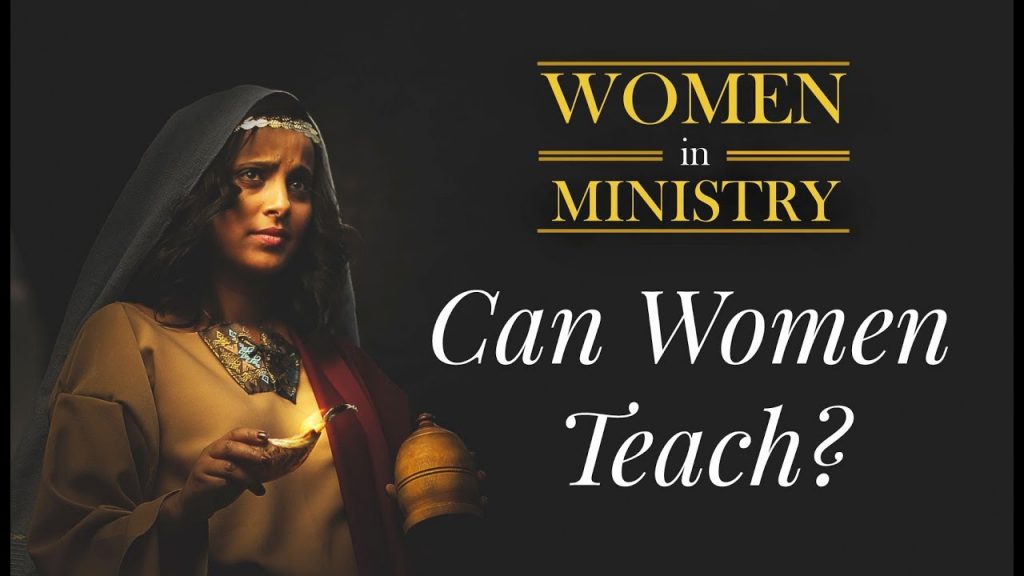
Women and Ministry A Tension between the Overlapping “Now” and “the Age to Come”
Jon Ruthven, PhD
It seems that the problem of women and ministry in the NT reflects a tension, not only between Christian tradition and modern culture, but also between two NT passages which appear to be contradictory, i.e., Gal 3:28 and 1 Tm 2:11ff. I think it’s important to get this apparent “contradiction” hammered out if we’re to avoid endless wrangling over the “women in ministry” issue. If one is a conservative on matters of scripture, one can’t simply appeal to the current cultural norms, either in Biblical times or today, for justification of Christian praxis. Many interpreters, particularly of 1 Tm 2, suggest that Paul is addressing a specific, historically limited situation that no longer applies to us. Once one starts relativizing scripture like this, then the finger is out of the dike: just about any command of the New Testament can be dismissed by relegating it to an “exceptional practice” in the first century. On the other hand, we simply can’t flow with the trends of our modern culture. If there is no biblical standard, who do we follow these days? Radical feminism? The gay rights movement? The pedophilia rights movement? Where does it stop? No, I firmly believe that Christianity, even like the original apostles, cannot “go beyond what is written” (1 Cor 4:6). I do think there is an approach to preserving the integrity of scripture on the one hand, and on the other reconciling these commands (1 Tm 2:11ff) with other scriptures (Gal 3:28; cf. Col 3:11–paraphrases of Joel 2:28?). Galatians 3:26-29 The Dissolution of Human Barriers in Christ It seems that Gal 3:26-29 uses some strong language vis a vis women: a) “you are all sons of God through faith (not gender) in Christ Jesus.” b) Those baptized “have clothed [them]selves with Christ.” The clothing metaphor is one of assuming authority (as firstborn of household, Lk 15, or as receptor of prophetic authority for ministry, Elijah passed his “mantle” to Elisha, cf. Lk 24:49; Acts 1:8 “’clothed’ with power”–a promise to women in the 120 at Pentecost; Lk 15–the “cloak” to the prodigal son was an explosive conveyance of primogeniture!) as well as simply for receiving the Spirit. c) Gal 3:26-29 is a clear paraphrase of Joel 2:28/Acts 2:17-18, which to the Jewish mind was the entrance into the “olam haba”’ the age-to-Come of the Spirit. In that age all would become filled with the Spirit, become prophets and become “as the angels”–no gender. The “in Christ” of Gal 3:26 is not talking only about a Protestant “salvation” for all genders and classes, but of prophetic ministry and authority for them as well. “Christ” is not simply Jesus’ last name, but the designation of the messianic bearer of the eschatological Spirit of prophecy. So to be “in Christ” is to be “in the state of the eschatological Spirit when ‘all Israel would become prophets’.” 1 Timothy 2:11-15 On the other hand, the language of 1 Tm 2:11ff. is strong and clear: women are not to teach or to take authority over men. There is no way to tap dance around this command. So how can these two passages both be true? Paul’s argument against women having “authentein” or teaching authority is based 100% on arguments from the “created, earthly order”–the pre-messianic, pre-Spirit context: First, Adam was “first” in creation (though feminists argue that Adam was only a “rough draft.”), implying a kind of primogenitur–the status of “firstborn.” Second, Paul seems to argue that the woman was the weak link in the temptation and “was deceived,” becoming, apparently the open
door for Adam’s fall. This female, as opposed to male, propensity for being “deceived” is puzzling and has generated lots of ink from commentators and dismay from many women. Nonetheless, he does use this argument against women teaching. Third, Paul states rather clearly that a woman characteristically retains her salvation [not via teaching] but in raising children and remaining in faith, love, sanctification and sobriety. This restriction infuriates a lot of women today, and men, for that matter. In traditional theology, all manner of qualifications and exemptions are applied to this passage. For example: both men and women can’t be the “teachers” of that time were more domineering–inappropriate for women; women can teach other women, not men; they can teach kids; can teach natives in foreign lands, etc.), but the message is stark and clear: women are commanded not to teach in a church setting. How can this argument apply canonically–to all places at all times in the Church? Remember, we can’t cut and paste unpopular commands by limiting them to unique situations in the New Testament era, as is popular in “gay” exegesis today. I believe the apparent contradiction can be solved if we recognize a temporal/develop-mental issue here: to the extent a body of believers exists in the age of the Spirit is the extent to which the gender [and other] distinctions become less significant. To the extent the body participates in this present created order (note, I didn’t say “fallen”–though that adds to the gravity–no pun. OK, pun) is the extent to which the distinctions, and hierarchies, continue. The distinctions are exacerbated by a broken relationship with God (both in Eden and in Timothy’s church), resulting in a power struggle: the woman strives after power (Gn 3:16c), precipitating a tyrannical response from her husband, though she is compensated by the ultimate empowering ability to produce children—a huge divine mandate in scripture that receives scant respect these days. In this context, like Rom 13 and the civil order, hierarchies are offered as an interim system—a temporary compromise—for preserving order in society, anticipating the ideal condition “in Christ,” when no one is struggling to dominate, but rather to serve. The 1 Tm 2 passage reflects a regression within the church from the ideal of Gal 3:28/Joel 2:28ff, or at least a polar tension in our existential condition of living in “the already, but not yet.” In this eschatological interpretive context, then, both sets of passages (pro and con) are true! What remains is to discern, through biblical “wisdom,” how and when the passages apply. There seem to be situations in which God gives absolute-sounding laws and commands appropriate for the developmental level of the readers (as in the “created order” of the 1 Tim 2:11 context, rather than in the “Spirit-order” of Gal 2:26-28//Joel 2:28), sometimes looking to a time when the commands might be reversed, as in the OT cases of sacrifices, divorce, revenge, that are reframed in Mt 5. In the NT Jesus recognizes the “milk/meat” problem of the need to teach the student, not the lesson (“many things I would teach you, but . . . .”), wherein what is true for one state of spiritual development is no longer true, or at least will be dramatically adjusted, for a more advanced stage. For example, I may say to my 3 year old: “Never cross the street!” But to a 10 year old, “Watch out for traffic before you cross the street.” Or to a 18 year old, “Go to the store (several streets away, with no instructions on safety even given).” Certainly the issue of applying scripture to one’s situation represents the temptation of Jesus (Mt 4; Lk 4), which was to pre- or mis-apply the rules of scripture without using biblical “wisdom,” i.e., divine revelatory confirmation as to their proper application. Is something like this going on within the NT regarding varying levels of maturity in relations between the sexes and other human classifications? Canonically, this rule (and its relevant passage) applies historically and geographically to churches who may have ranged from “milk” level to “meat” level of spiritual development. Certainly, there is a tension in behavior and responsibility with respect to our struggle with sin: we live both in Romans 7 and Romans 8: we are, as Luther says, simultaneously sinful yet justified.
We all, of course, live in both ages: this age and the one to come (“upon whom the end of the ages has come”). The Corinthian women and men had to learn about living in both ages in tension: one could not live in the flesh and expect to operate as though one were already completely in the age to come. Certain developmental stages needed to be realized first: the kingdom is characterized not by power positions, but by servant positions; not by exclusivity, but by “receiving the little [undesirable] ones.” In this context struggles for power—a characteristic of the fallen state–are superseded by struggles to build up the body (the ideal of the “one flesh” in Gen 1:27 & 2:7, 23), in which, when one is exalted–even women–all rejoice! Instead of worrying about who’s boss (a self-destructive, “earth-bound” response to insecurity, e.g., by the abused women of radical feminism as well as tradition-bound Fundamentalist men), the Christian relinquishes that worry because of the underlying empowerment of the Spirit: a secure person is not concerned about power and position, but rather is concerned about Christ’s mission: to see to it that others grow, prosper and be empowered. Hence, “equality” of the sexes, or any other classes, for that matter, is a non-biblical concept. “Equality” presupposes conflict and competition for power. Equality is a political compromise between two or more suspicious and wary combatants. By contrast, the NT does not espouse “equality,” but rather, “unity”: we are not “equal” in Christ Jesus, but, higher than that, we are “one.” The Christian has relinquished claims of “equality,” choosing rather to become a servant to others: to see them built up and empowered first, being secure in the knowledge that it is God who provides one’s security. Bottom line? I believe the biblical rule is this: “To the extent that a local church is ‘in the Spirit’ is the extent to which all human barriers become increasingly irrelevant as to who expresses the Spirit’s leading–since there is a common acknowledgement that the Spirit is ministering (Gal 3:28). On the other hand, to the extent to which a local church remains in the ‘created order’ (Paul appeals to that in 2 Tm 2), then the interim solution to power struggles of the ‘present age’ apply, i.e., a hierarchical chain of command, much as the ‘powers that be’ (also ordained by God, Rom 13) very imperfectly regulate society to avoid an even worse outcome: chaos caused by unrestrained conflict. Some years ago I had to put my money where my mouth is. I strongly encouraged my wife, despite her misgivings, that she had the wherewithal for a PhD. Her academic performance proved to be spectacular: she actually received her degree 6 months before I did, though I had started 3 years earlier. Our students, during this time, gleefully referred to us as Dr. and Mr. Ruthven—an address in which, in an academic environment in which competition is everything, I took pride in the fact that I had a part in encouraging her to grow “beyond me” in developing her God-given ministry.




Comments